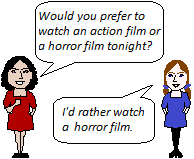
We find at Carole Brown Idiomas that It is often difficult for our learners of English to know when to use ‘rather’, ‘rather than’ or ‘would rather’. To help clarify, we have broken it down into three sections exemplifying its use in each.
Section one
RATHER
Rather is an adverb of degree or more simply put a modifier. It can be used with nouns i.e. That’s rather a shame. It can be used with adjectives i.e. She’s wearing a rather nice jacket. It can be used with adverbs i.e. He looks rather ill today. It can be used with comparatives i.e.That’s rather more difficult than I thought
Section two
RATHER THAN AND WOULD RATHER
When we talk about preferences, we use two structures 1) rather than 2) would rather. Here are a few examples demonstrating this
RATHER THAN
- It would be better to go on holidays in June rather than in August
- I would prefer to stay late to finish the job rather than leave early
- He decided to get a taxi rather than wait for a bus
WOULD RATHER
The expression would rather is followed by the infinitive without ‘to’. We also contract I would to I’d
- Would you rather live in the city or in the country?
- I don’t want to ear meat for dinner tonight, I’d rather have fish
- I’d rather buy my groceries in the supermarker than buy them on-line
Section three
ANOMALIES
It is important to note that there are some atypical ways in which rather can also be used
- Rather can suggest ideas such as ‘more than was expected’ i.e. That Polish girl over there speaks English rather well ( = she speaks English remarkably well)
- It can also mean ‘ more than is usual’ i.e. It is rather cold for this time of year
- It can also be used to mean ‘more than is wanted’ i.e. I paid rather more that I had budgeted for our holidays last year